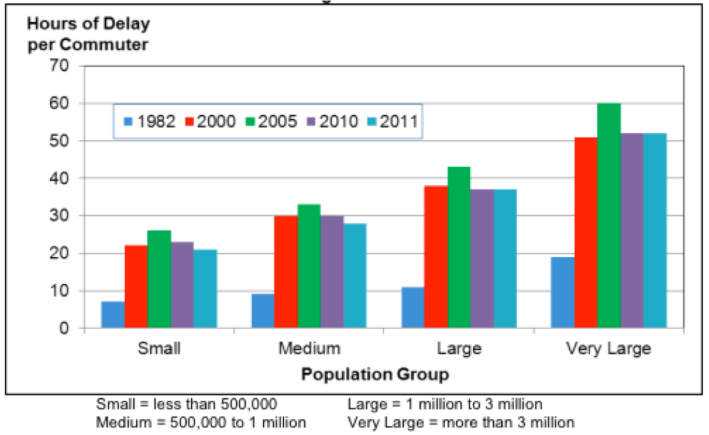
There’s so much to unpack in the landmark report released by U.S. PIRG and the Frontier Group earlier this week on transportation trends. Tuesday, we focused on the disparity between government transportation forecasts and recent realities. We also took a look at a few reasons to believe that the millennial generation – those aged 13 to 30 right now -- will continue to drive less than previous generations. One of those reasons is that technology has reduced our need to drive in many different ways.
The report also makes clear the need to recalibrate our strategies around congestion. When roads get congested, calls for highway expansion grow to a deafening pitch. The reality that transit and road pricing are better solutions for congestion don’t compute amid the panic.
The most recent Texas Transportation Institute congestion report came out under the headline, “As Traffic Jams Worsen, Commuters Allowing Extra Time for Urgent Trips.” Lots of doom-and-gloom language when what they really mean is that congestion is easing.
That's right. Reduced congestion has been one of many benefits of the reduction in miles driven over the past eight years. As of 2011 – the latest year for which data is available – congestion was about as light as it was in 1998. And it had been down at that level for four years. The annual toll on car commuters went from 43.1 hours of delay to 42 hours in 2007 and then dipped way down to 37.6 – and stayed there for the next three years. In 2011 it inched up by less than half an hour to 38.0 [PDF].
So where is all this “urgency” about “worsening” congestion coming from?
Maybe everyone is just so used to talking about increased congestion – and using that to justify costly road-building bonanzas – that they just haven’t wrapped their heads around the new reality yet. And it's no wonder, per capita driving rose 85 percent, to over 10,000 miles a year, between 1970 and 2004. To mitigate congestion, that driving boom was followed by a highway boom – the PIRG/Frontier report notes that between 1980 and 2010, the nation built the equivalent of "a new lane of freeway stretching from New York to Los Angeles every single year."
But then VMT started to diminish, due to a number of factors, and voila, traffic diminished too. “Further reductions in driving could lead to additional easing of congestion without massive investments in new highway capacity, as long as roads are maintained in a state of good repair,” they write.
Here’s a caveat about all this good news that congestion is down: Lower congestion has a tendency to induce driving.
“Congestion is a chicken-and-egg kind of thing,” report co-author Phineas Baxandall of U.S. PIRG told Streetsblog. “It’s easier to say that there’ll be less urgency about road congestion than to say exactly what will happen to road congestion.”
The best way to make sure congestion stays down is to implement road pricing. Now that more and more people are driving less anyway, maybe it would be a good time for the U.S. to dip its toes into this practice that’s worked so well in parts of Europe.
Road pricing could also be helpful when it comes to large truck traffic. As Baxandall and co-author Tony Dutzik note in “A New Direction”:
Heavy-duty trucks impose far greater damage on roads than light-duty vehicles. As a result, a future in which there are fewer miles driven overall, but more of them in heavy trucks, could result in similar or greater wear and tear on highways. However, the number of miles driven in the heaviest trucks has actually declined faster than overall vehicle travel in recent years, falling by 11 percent between 2007 and 2011.
Meanwhile, a 2009 government-appointed commission declared that vehicle miles traveled by heavy-duty trucks would increase by an average of 1.8 percent per year.
Freight traffic is likely subject to some the same trends as other driving. As people move to cities, there’s less pressure to get goods farther out to suburbia -- though the shift out of the suburbs and into the cities probably hasn’t been pronounced enough yet to make a real impact. Changes like online shopping have brought some changes in trucking, with heavy trucks going to centralized warehouses, rather than individual stores, and then lighter trucks making deliveries. A push toward freight rail and water travel might also be helping reduce the number of trucks on the road.
But truly, lower truck traffic is probably still a result of the ongoing economic slump and might rebound with a stronger economy, even while other driving rates stay low.
It might not matter that much. As of 2011, “combination trucks,” or semis, were responsible for about 5.6 percent of total VMT, according to the FHWA. Although they have a disproportionate impact on road wear and tear – and on congestion – they still make up a fairly small share of total vehicle traffic. So even an economic rebound could see congestion rates stay far lower than the 2005-2006 peak.





